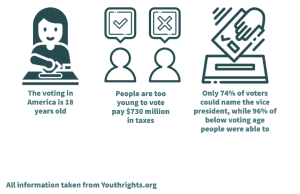Con
January 24, 2023
In the past decade, some towns in Maryland, such as Takoma Park and Hyattsville, have chosen to lower the voting age to 16. These cities’ main goal in doing so is to promote civic engagement in the youth, however, this may be wishful thinking. 16 and 17 year olds are not mature enough to take on the significant task of voting because they aren’t mature or have the knowledge of many of the issues that politicians discuss.
According to the Alcohol Pharmacology Education Partnership (APEP) at Duke, At the age of 16 and 17, the brain is developed with an exception of the prefrontal cortex. The prefrontal cortex is critical to a person’s decision making. Without the prefrontal cortex fully developed, how can we be sure that these newer, younger voters won’t make careless and uninformed decisions when voting?
16 and 17 year olds may be turned off from voting due to their lack of knowledge when it comes to economic issues. In the 2020 presidential election, the most popular issue that politicians run on is the economy. Many of the sub-issues that are in the economic debate – such as lowering taxes and reducing inflation – can be best understood by those who are directly affected by these economic changes, which is mainly people over 18.
“Today, just over one-third, or 35%, of teens between the ages of 16 and 19 are part of the workforce,” CNBC reported. “Those who are still on the family dole and don’t pay bills can’t fully appreciate the implications of politicians’ platforms on the economy.”
Another concern is the already low turnout for those of the younger generation. According to the United States Census Bureau, the voter turnout in the 2020 election for citizens ages 18-34 was 57%, which was 12% less than citizens ages 35-64 and was 17% less than citizens ages 65 and up. As seen in this pattern, the younger generations are less likely to vote, which would be even more exacerbated in the 16-17 age category. Allowing 16 and 17 year olds to cast a ballot is already risky, so why risk allowing them to vote if they won’t even want to go to vote.
Looking more inwards, 16 and 17 year olds at CESJDS are faced with an additional issue: school on election day. As a result of people having the day off, many students won’t be able to vote because election day is usually when most people remember to vote.
While encouraging civic participation from the younger generation is laudable, it would not serve our country well to allow 16 and 17 year olds to vote. They are simply not mature enough to grasp the complexities of American politics and to cast a meaningful ballot.









Olivia • Apr 16, 2024 at 10:16 am
This shows a good opinion and is a good fact!
Deneya • Apr 25, 2023 at 10:43 am
I’m sorry but i must disagree with your point of the issue.